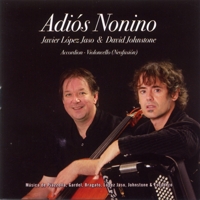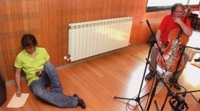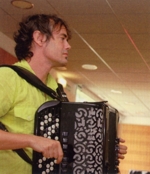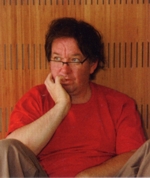| Adiós Nonino by Neofusión
Buy this album now CD: £10.50 + p&p
“I thank you for the courtesy of sending me the CD,
with my tango ‘Impresionista’; to me it seems a really
beautiful version, I congratulate the two of you. With my sincere
appreciation and my greetings”
|
Adiós Nonino
| 1 | Adiós Nonino Duo |
Astor Piazzolla/José Bragato | 10’ 46" |
| 2 | Improvisación sobre Libertango Solo accordion |
Astor Piazzolla | 5’ 29” |
| 3 | Fantasía para Nahia Solo accordion |
Javier López Jaso | 5’ 44” |
| 4 | Vivencias Duo |
Javier López Jaso | 5’ 31” |
| 5 | Le Petit Tango Solo cello |
David Johnstone | 4’ 27” |
| 6 | Bulerias (flamenco) Solo cello |
Mario Escudero / Werner Thomas-Mifune |
3’ 54” |
| 7 | Por una cabeza Duo |
Carlos Gardel | 2’ 41” |
| 8 | El día que me quieras Duo |
Carlos Gardel | 5’ 22” |
| TOTAL TIME: | 44’ 14” | ||
Sleeve Notes The tango was born at the end of the 19th century in the poorer districts of the important Argentine cities, a type of dance music with African influences. It was heard in small groups that usually included the violin, the piano and the bandoneón, a kind of concertina that arrived from Germany in the 1890’s. However, what nobody could imagine was its rapid development; in less than twenty years it became possible to hear it in the most important Dance Halls and concert halls.. A role for singers as soloists became increasingly more frequent, and in the 20’s and 30’s the Tango was launched away from the frontiers of Argentina with intrusions in North-American films and with the universal fame of some singers such as the great Carlos Gardel. Carlos Gardel, film singer and actor who became a naturalized Argentinian, is considered the most important ‘tanguero’ (tango man) in the first half of the 20th century. According to some investigators he was born in Toulouse, France, on the 11th December, 1890, and according to others he was born in Tacuarembó, Uruguay on the 11th December of 1887. In either case he lived from infancy in Buenos Aires. He died on the 24th June, 1935, in Medellín, Columbia, in an airplane accident. When Gardel died he was at the height of his career, and millions of followers were crying with news of his death. His last years were bathed in glory; popularly the people said “Gardel sings better and better every day”. A verse of his tango ‘Volver’ (in English, ‘Return’) became a famous saying across all of Latin America “Twenty years is nothing”. The version of Jaso – Johnstone for accordion and cello of ‘Por una cabeza’ is marked by the continual dialogue of the two instruments, where melodic moments and improvisations are interspersed. This precious melody is heard present in the film “Tango Bar”, filmed in 1935 in Long Island (New York). It has been used in at least four films in the decade of the 90’s. It is basically of a happy character but is at the same time sad, due to the frequent changes between the major and minor modes. ‘El día que me quieras’ comes from the film of the same name, also of 1935. The version of Jaso and Johnstone is most sensitive and individually personal. It is included here as a kind of special homage to this great figure who, together with Astor Piazzolla, has defined the course of the tango in the 20th century. The Tango is without doubt the most sensual and passionate of all the salon dances. When it hit across all of Europe, the Pope Benedict XV protested in strong language saying “It is a scandal that this pagan and indecent dance is destroying the social and family life, it is danced even in the Pope’s residence!”. It is true that perhaps the tango is the dance where the most understanding and intimacy is asked of the couple, and this has to reflect in the interpretation of the music. Astor Piazzolla was born in 1921 (Mar del Plata) at the beginning of this period of tango expansion. However, he grew up in New York where he first made contact with the bandoneón. At only 13 years of age he was contracted by the then famous Carlos Gardel! Piazzolla, after many years of study and trial, arrived at the perfect fusion between classical music, the tango, and his jazz influences, to be able to produce works with the soul of “tango” and with all the mastery of an important classical composer with his dissonances, counterpoints and complex structures, without losing his great sensitiveness as a composer of delightful melodies. This mastery is noticed immediately with ‘Libertango’, hereby presented in an improvised virtuoso version of Javier López Jaso. The biting rhythms and the harmonic tension of the phrases are accentuated in this interpretation for solo accordion. ‘Adios Nonino’ has a very important reason of being; it was written after the death of the father of the composer. It is surely one of his most well-known works, and one of the most arranged (in fact, it should be pointed out that David Johnstone himself has orchestrated the version of Bragato of this as a concerto piece for solo cello and string orchestra). The interpretation of Jaso and Johnstone has authenticity – the base of their version is that very fabulous free transcription of José Bragato, the favourite cellist of Piazzolla and one of his most closest collaborators in the 1950’s and 1960’s). His writing for cello and piano is always grandiose; from this Jaso introduces many new fusions and a clear tendency towards the jazz world – something that Piazzolla himself liked. Javier López Jaso is one of the most notable Spanish accordionists in the current musical panorama. With a solid classical career behind him, his musical evolution has taken him to the road of jazz and improvised music. His work ‘Vivencias’ originally dates from 2002 – for cello and accordion – but in this recording he has enriched the writing with a rather more modern jazz-like language. His Fantasía para Nahia’ is a piece for Accordion solo, with small flamenco influences, ‘Piazzollian’ ideas, and jazz harmonies. In this piece one can clearly see his musical evolution – it dates from 2008. David Johnstone, British, but also with Spanish nationality, is, like Jaso, a musician who is open to new worlds, with a pleasure for the ‘fusion’ music. His Le Petit Tango’, for Cello solo, is a small contribution to the almost non-existent repertoire of tango-like pieces for this instrument without accompaniment. It is in ternary form – A-B-A – and was conceived as an innocuous joke, and at the same time a little homage to Astor Piazzolla (Le Grand Tango of Piazzolla is a work that Jaso and Johnstone have played tens of times). The piece is dedicated to the Argentine Rodolfo Zanni, cello professor in Catalonia (Spain), and a colleague of Johnstone in the tango world. The virtuoso ‘Bulerias’ of Mario Escudero in this version of Thomas-Mifune/Johnstone is not tango as such, but is a perfect example of concert music performed by Johnstone showing his delight for fusion music and music of its ‘roots’. Credits Remembering the great Carlos Gardel in the 75th anniversary of his death (2010) All versions and arrangements in this CD are by Javier López Jaso and David Johnstone Productor/Producer:
Javier Ecay
|
| Instruments: | Accordion and Cello |
| Genre: | Contemporary |
| Format: | Audio CD |
| Our Ref: | A0389 |
| MCPS: | ZETA013 |
| Label: | Zeta |
| Year: | 2010 |
| Origin: | Spain |
NEOFUSIÓN
In its first years Neofusion has offered concerts in many different festivals and cycles of music, governments and town halls, and has fulfilled ambitious projects such as a tour of Morocco (Tetuán, Rabat and Fez), a tour of Britain (Manchester, Liverpool and Leeds), both organized by the Cervantes Institute of Spain, appearances in France and Italy, the launch of ‘Sensaciones’ (a CD homage to Astor Piazzolla), the International Mediterranean Festival (Cartagena), and important premieres in the Musikaste Contemporary Music Festival Eresbil-Ereziak (Basque Country, Spain), etc. … Another important undertaking has been the recording for national Spanish television ‘Tele Cinco’ (sound and image) of four special programmes featuring the music of David Johnstone, Javier Lopez Jaso and Martín Zalba. In Great Britain the radio stations B.B.C. and Jazz F.M. have included special programmes of their versions of music by Piazzolla, and have also been heard on radio in the USA and Brazil. There are plans for the premiere of new works and different musical arrangements for the duo of accordion and cello, adding to their existing repertoire. |
|
|
Javier López Jaso is one of the most notable Spanish accordionists in the current musical panorama, progressing musically towards jazz and improvised music. He works in musical groups with first-class musicians, investigating new improvisational resources as applied to the accordion. He has given concerts in Spain, France, Germany, Sweden, Cuba, Morocco, Turkey, United Kingdom and Italy, and his own works have been played in countries such as Spain, France, United Kingdom, Turkey, etc. He is co-founder together with Marcelo Escrich and Tommy Caggiani of ‘New Mood Trio’, amongst others. Contact for Javier LÓPEZ JASO: |
|
David Johnstone is
considered one of the most creative and interesting cellists in
the Spanish musical scene today, combining his activity as a performer
with that of a composer. Although British by birth he has been,
for more than a decade, principal cello of the ‘Orquesta
Sinfónica de Navarra’ (Spain), and a composer with
a specialization towards string instruments and/or lighter classical
music. He portrays a great versatility which enables him to participate
as cellist in many, and varied musical activities. He is cellist
of the ‘B3 Classic’ Trio (clarinet-cello-piano). His
own original music has been heard in more than 25 countries across
four continents. Contact for DAVID JOHNSTONE: Web: www.johnstone-music.com or www.j-music.es E-mail: info@johnstone-music.com Tel: (+34) – 948 – 351869 (también fax) Dirección: Apto. Correos 7003, 31080 Pamplona, Navarra, Spain |
| Creighton's Collection publishes,
prints and distributes the full catalogue of David Johnstone compositions click for details |
|||||||
 |
 |
 |
 |
 |
 |
||
 |
 |
 |
 |
 |
 |
||
| The Scores shown above are some of special interest to Accordion and cello players | |||||||
 Homage
to Carlos Gardel with works of Gardel and
Piazzolla, and other items of great interest. Both virtuosic
and medolic, this is a master combination of the possbilities
of the accordion - cello duo.
Homage
to Carlos Gardel with works of Gardel and
Piazzolla, and other items of great interest. Both virtuosic
and medolic, this is a master combination of the possbilities
of the accordion - cello duo.  The group Neofusion, originally
conceived with a base of accordion and cello from the hands
of Javier López Jaso and David
Johnstone, stands out for the interpretation of original works,
arrangements and other music of varied forms of the 20th century,
with especial attention to the tango and tango-fusions, where
their original and ‘catchy’ versions certainly do
not go unnoticed by the public.
The group Neofusion, originally
conceived with a base of accordion and cello from the hands
of Javier López Jaso and David
Johnstone, stands out for the interpretation of original works,
arrangements and other music of varied forms of the 20th century,
with especial attention to the tango and tango-fusions, where
their original and ‘catchy’ versions certainly do
not go unnoticed by the public. 








